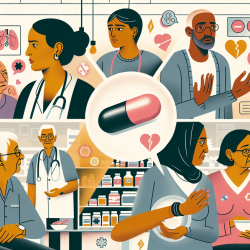Introduction
The COVID-19 pandemic has underscored the importance of community collaboration in public health, particularly in marginalized communities. The research article, "African American Faith Communities and Public Health: Working at the Intersections of COVID-19," provides valuable insights for practitioners looking to improve their skills and outcomes by engaging with community leaders. This blog will explore key strategies from the research and encourage further investigation into these practices.
Key Strategies for Practitioners
The research highlights four strategies that can expedite recovery from the pandemic and promote lasting societal change:
- Building Trust-Based Relationships: Practitioners should initiate and maintain ongoing relationships with faith communities that are grounded in trust. Trust is foundational for effective communication and collaboration.
- Recognizing Community Knowledge: Faith community leaders possess unique insights into their communities. Practitioners should acknowledge and leverage this knowledge in planning and decision-making processes.
- Inclusive Partnerships: Faith leaders should be included as full partners in strategizing, problem-solving, and policy development. Their involvement ensures that community needs and perspectives are considered.
- Comprehensive Approaches: An intersecting approach that addresses the multifactorial realities of COVID-19 is essential. This means considering biological, psychological, social, and spiritual aspects in solutions.
Implementing the Research Outcomes
Practitioners can enhance their skills by implementing the strategies outlined in the research. Here are some practical steps:
- Engage with Community Leaders: Establish regular communication with faith leaders to understand community dynamics and build trust.
- Collaborate on Health Initiatives: Work with faith communities to co-create health initiatives that are culturally relevant and community-driven.
- Participate in Community Events: Attend community events and gatherings to build rapport and demonstrate commitment to the community's wellbeing.
- Provide Resources and Support: Offer resources and support to faith leaders to help them address community health challenges effectively.
Encouraging Further Research
The research underscores the need for ongoing exploration into community-public health collaborations. Practitioners are encouraged to delve deeper into the following areas:
- Trust Dynamics: Investigate the factors that influence trust between public health officials and marginalized communities.
- Impact of Structural Racism: Explore how structural racism affects health outcomes and trust in public health systems.
- Role of Faith Leaders: Study the impact of faith leaders as trust agents in public health initiatives.
Conclusion
By implementing the strategies outlined in the research and pursuing further investigation, practitioners can improve their skills and create better outcomes for communities. Collaboration with African American faith communities offers a pathway to addressing health disparities and fostering trust in public health efforts.
To read the original research paper, please follow this link: African American Faith Communities and Public Health: Working at the Intersections of COVID-19.










